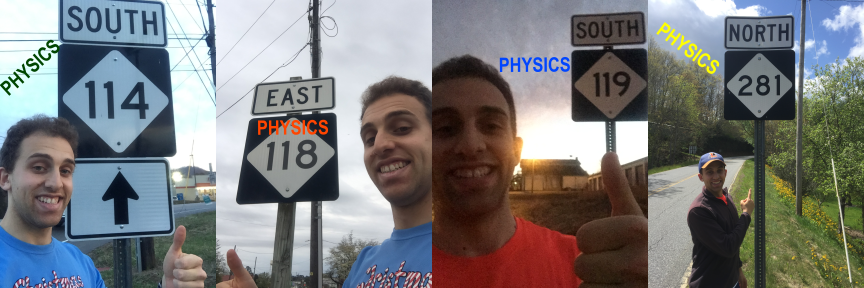Looking for my current courses at Davidson College? You can find them here.
During my time as a graduate student at UNC, I have gained experience teaching four undergraduate courses. Starting as a TA and working my way up to instructor of record, I have been committed throughout to employing evidence-based teaching practices. My aim is to build a welcoming and inclusive classroom in which students learn collaboratively, and build knowledge through action. This pages summarizes my experience — for a complete overview, see my CV.

Click here to learn more about my travels to find these signs
- NC 114 starts at I-40 about 2.5 hours west of Chapel Hill, and travels north for just 2.6 miles into the town of Drexel, NC. This photograph was taken at the intersection with US-70 in Drexel.
- NC 118 starts in the town of Grifton (northeast of Kinston, NC), about 2 hours east of Chapel Hill, and travels further east for 18.5 miles to Vanceboro. I took this photograph in downtown Grifton.
- NC 119 is the longest highway on this list, and it also happens to be the closest. It begins about half an hour west of Chapel Hill at an intersection with NC-54 outside of Burlington, and continues north through downtown Mebane (where it comes within 2,000 feet of Orange County), and on to the Virginia state line. The total distance is 43 miles. This photo was taken at the intersection with highway 86 in rural Caswell County.
- NC 281 was the most challenging, but the most fun to photograph! The 37 mile scenic road winds through the mountains of western NC’s Nantahala National Forest, and its closest approach to Chapel Hill is over 4 hours west along US-64 at Lake Toxaway. The road starts on the South Carolina border (5 miles from Georgia) and continues North to the Tuckasegee community. This photo was taken during some down time while competing in the Smokey Mountain Relay.
Physics 281L: Experimental Techniques in Physics
Overview: This course explores modern physics experiments and techniques, as well as a variety of data and uncertainty analysis approaches to prepare students for research and advanced laboratory work. Emphasis is placed on both written and oral scientific communication, with assignments designed to hone students’ abilities to convey results and form persuasive arguments for a variety of audiences. Collaborative learning is emphasized, with a majority of assignments submitted as groups.
Semesters Taught: Instructor of record (lecturer and lab coordinator) for Summer Session I 2019 and 2020. Co-instructor for Fall 2019, Spring 2020, Fall 2020, Spring 2021, Fall 2021. Advisory role: Spring 2022.
Find Out More via this course syllabus, and at my PHYS 281L page.
Physics 114: General Physics I For Students of the Life Sciences
Overview: This course covers the basic principles of physics, including forces, energy, oscillations, sound, diffusion, and heat transfer, and applications to biological systems. It is intended to meet the needs of, but is not restricted to students majoring in the life sciences. The course is taught in the “lecture-studio” format. Lectures are used to introduce concepts, while the subsequent studio sessions allow students to engage with the material via problem solving in a collaborative, active manner.
Semester Taught: Instructor of record (lecturer and studio instructor/coordinator) for Summer Session II 2018.
Find Out More via this past course syllabus, and at the UNC Introductory Physics page.
Physics 119: Introductory Calculus-Based Electromagnetism and Quanta
Overview: This course covers the unification of the laws of electricity and magnetism, electromagnetic waves, particle-wave duality, and fundamental principles and applications of quantum mechanics. The course is taught in the “lecture-studio” format. Lectures are used to introduce concepts, while the subsequent studio sessions allow students to engage with the material via problem solving in a collaborative, active manner.
Semesters Taught: Teaching Assistant (studio instructor) for Fall 2017 and Spring 2018.
Find Out More at the UNC Introductory Physics page.
Physics 118: Introductory Calculus-Based Mechanics and Relativity
Overview: This course covers the mechanics of particles and rigid bodies. Topics include Newton’s laws, mechanical and potential energy, mechanical conservation laws, frame-dependence of physical laws, and Einstein’s Theory of Relativity. The course is taught in the “lecture-studio” format. Lectures are used to introduce concepts, while the subsequent studio sessions allow students to engage with the material via problem solving in a collaborative, active manner.
Semesters Taught: Teaching Assistant (studio instructor) for Fall 2015, Spring 2016, and Spring 2017.
Find Out More at the UNC Introductory Physics page.